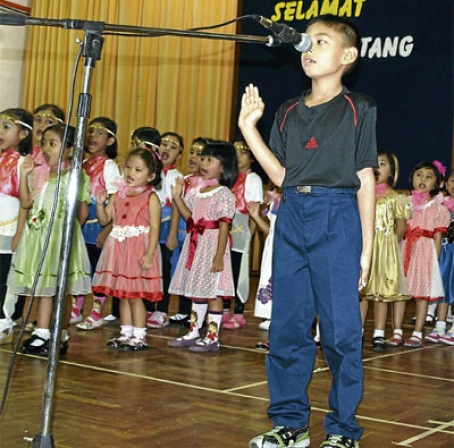Whither Rukunegara?
Professor Tan Sri Dato' Dzulkifli Abdul Razak
Learning Curve: Perspective
New Sunday Times -10-06-2012
PANCASILA, the five basic principles that make up the official foundation of the Indonesian state, celebrated its 67th anniversary last week.

Mohd Ridhwan Hakim takes the lead in reciting the Rukunegara
Pañca (five) and sila (principles) were devised as inseparable and interrelated "goals" for the newly born nation in 1945 by the then President Sukarno.
It was promulgated with the aim to unite the diverse archipelago and communities that represent Indonesia. Its central significance is reflected in the Pancasila shield embedded in the heart of national symbol of the Garuda.
Its spirit and ideals have served Indonesia well -- citizens commit themselves to building a nation through one language irrespective of diverse identity.
Since 1965, Oct 1 is Hari Kesaktian Pancasila which is celebrated yearly. It coincides with the foundation of the New Order, marking Soeharto's so-called victory over an alleged Communist coup attempt known as the G30S movement that began a day before, on Sept 30, 1965, Pancasila is highly regarded by Indonesians in general. Life-sized statues of the "martyrs" of Pancasila have been erected.
However, of late, there have been claims that Pancasila has become marginalised both as the nation's reference and social discourse, even in schools and colleges. This was clearly spelt out in the opinion page of the Jakarta Post on the anniversary of Pancasila on June 1.
Interestingly, the illustration on the page showed the Pancasila engulfed in the flames of selfishness; intolerance; greed for power and wealth; and violence. The motto "Unity in Diversity" beneath the shield was in tatters. The illustration carried a caption: "Save our basic values! Or we will have no Indonesia anymore... "
Non-governmental organisation Sekolah Tanpa Batas director Bambang Wisudo wrote: "Rediscovering Pancasila education for our children is urgent to ensure the future of our nation as we commemorate the 67th anniversary of Pancasila today."
He lamented the widespread corruption, brutality and threats from radicals, and pointed to the need for Pancasila education in classrooms from primary to university level. Apparently Pancasila education has lost its appeal.
I was with a group of Malaysian students in Medan when the issue of Rukunegara was raised. While most can recite the five principles of the Rukunegara, many were baffled as to its significance in real terms.
Rukunegara, which was proclaimed on Merdeka Day in 1970, is much younger than its Indonesian counterpart.
However, both share the goal of bringing about unity. The Rukunegara was declared in reaction to the May 13 incident in Malaysia that had happened a year before. Like the Pancasila, Rukunegara too seems to have no effect on the younger generation.
Some even observed that the tenets are not even on the walls of schools. Unlike the Pancasila, Rukunegara is not integrated into the national coat of arms to give it the importance it deserves.
Bernama reported that on Dec 8, 2005, the Malaysian government had made the reciting of the Rukunegara compulsory at official functions. It is, after all, considered a "national ideology" formulated with the purpose of guiding nation-building efforts. But one is uncertain if this is a common practice today!
Last week, this column commented on the suggestion of re-introducing caning in schools. What happened to the teaching of Rukunegara to instil discipline into schoolchildren?
The same flames that devoured the shield of Pancasila is also consuming the Rukunegara. There are also numerous allegations of bribery and corruption in Malaysia.
Given that we are in the midst of an education review, Bambang's proposal is worth considering and Malaysia must revitalise its Rukunegara education, with emphasis on character building.
- The writer is the vice-chancellor of Albukhary International University
